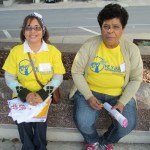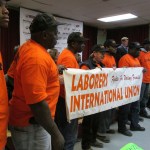safety
by Kim Krisberg
Texas construction workers who've lost their lives on unsafe worksites may be gone, but they certainly haven't been forgotten. Earlier this week, hundreds of Texas workers and their supporters took to the streets to demand legislators do more to stop preventable injury and death on the job. They took their demands and the stories of fallen workers all the way the halls of the state capitol.
Just two days ago, workers from every corner of the Lone Star state made their way to Austin to take part in the Day of the Fallen, a day of action to memorialize construction workers…
In an editorial published today in the Journal of Public Health Policy, Anthony Robbins, MD, MPA calls on the public health community to take on the social problem of distracted driving caused by mobile devices.
"Only a public health strategy is likely to weave government, commercial, community, and individual tools available in schools, workplaces, and neighborhoods, into a comprehensive approach to make people safer while on or near roads."
Robbins argues that the problem is more complex than drivers behaving badly.
"Around the world, new communication technology is ever more…
Most of the tributes to former Surgeon General C. Everett Koop, who died yesterday at age 96, are quick to remind us that he became a household name. As the New York Times' story notes that "is a rare distinction for a public health administrator." Dr. Koop's notoriety could be attributed to his "long silver beard and white braided uniform," as TIME magazine noted, to his pronouncements in 1986 about the health effects of second-hand tobacco smoke, and for his eventual warnings about the risk factors associated with contracting HIV. The USA Today's obituary about the Reagan-…
by Kim Krisberg
For many migrant farmworkers, the health risks don't stop at the end of the workday. After long, arduous hours in the field, where workers face risks ranging from tractor accidents and musculoskeletal injuries to pesticide exposure and heat stroke, many will return to a home that also poses dangers to their well-being. And quite ironically for a group of workers that harvests our nation's food, one of those housing risks is poor cooking and eating facilities.
A group of researchers and advocates recently decided to take a closer look at such facilities among migrant farmworker…
by Kim Krisberg
After nearly three decades as a USDA food safety inspector, Stan Painter tells me he now feels like "window dressing standing at the end of the line as product whizzes by."
Painter, a poultry inspector with the Food Safety and Inspection Service (FSIS) stationed in the northeast corner of Alabama in the town of Collinsville, is a first-hand witness to USDA's recently proposed rule to speed up poultry inspection lines while simultaneously reducing the number of federal food inspectors and turning over much of the food safety oversight to plant employees, who could have little…
by Kim Krisberg
A couple years ago, two Johns Hopkins University public health researchers attended a public hearing about the possible expansion of an industrial food animal production facility. During the hearing, a community member stood up to say that if the expansion posed any hazards, the health department would surely be there to protect the people and alert them to any dangers. The two researchers knew that due to limited authority and resources, that probably wasn't the case.
"We felt like there was this false sense of comfort among the public," said Roni Neff, one of the two…
Greg Byers, 43, worked underground at Arch Coal/ICG's Pocahontas Coal Mine in Beckley, WV. On the afternoon of July 31, 2012, he suffered a serious crushing injury. He died later that day.
Byers was a U.S. Marine who'd been working as a coal miner for five years. His employment at the Pocahontas mine, which employs nearly 300 workers, began about a year earlier. His job was "scoop operator." He used a hefty vehicle to scoop up the loose coal from the mine floor after the mining machine had done its work. When there's no coal to scoop, the equipment operator…
by Kim Krisberg
Texas may boast a booming construction sector, but a deeper look reveals an industry fraught with wage theft, payroll fraud, frighteningly lax safety standards, and preventable injury and death. In reality, worker advocates say such conditions are far from the exception — instead, they've become the norm.
Such conditions were chronicled in a new in-depth report released earlier this week. Researchers, who surveyed nearly 1,200 construction workers in Dallas, San Antonio, Houston, Austin and El Paso, found that one in five construction workers experienced a workplace injury…
[Updated below (6/24/2013)]
The Huffington Post's Dave Jamieson has a story today from the Kentucky coal fields that has my head shaking in disbelief. Reuben Shemwell, 32, says he was fired by Armstrong Coal after complaining about safety problems, including asphyxiation hazards and inappropriate respirators. As provided by the federal Mine Act (Section 105(c)), Shemwell filed a complaint with the U.S. Labor Department's MSHA for wrongful discharge. Now he finds himself being sued by his former employer in Kentucky state court. Armstrong Coal claims that Shemwell…
by Kim Krisberg
When it comes to good health, America is far from top dog.
Yes, we may spend the most, we may have some of the most advanced medical technologies and we may produce some of the best doctors. But when it comes to the ultimate measure of a health care system's success — the health of people and populations — it seems we are losing a winnable battle.
"There's hardly anything more consequential than Americans dying earlier and being sicker," Dr. Steven Woolf, chair of the Institute of Medicine's and National Research Council's Panel on Understanding Cross-National Health…
In the month's preceding the deadly explosion in April 2010 that killed 29 coal miners, Massey Energy's Upper Big Branch (UBB) mine had racked up hundreds of serious violations of safety standards. In 2009 alone, this included 48 orders from federal mine inspectors to withdraw workers from the UBB mine because of dangerous conditions. But Massey knew how to game the system. Mine managers would make a couple tweaks, correct the immediate problem, and it was back to mining coal. usually within an hour or so. There was no real consequence for their or other mine…
We commemorate today the life of Reverend Martin Luther King, Jr., the inspirational civil rights leader who was assassinated at age 39 in Memphis, Tennessee on April 4, 1968. Rev. King was visiting Memphis to support hundreds of city sanitation workers in their demands for safer working conditions and dignity on the job.
Martin Luther King Jr.
In an interview taped for the StoryCorps project, Mr. Elmore Nickelberry and Mr. Taylor Rogers describe their experience as Memphis sanitation workers in 1968.
Taylor Rogers: "Our day was awful. Everyday. We had these tubs…
by Kim Krisberg
"To know you participated in building something in your city — it's just an experience, you know?"
Those are words from Austin, Texas, native Christopher McDavid, 22, a graduate of the city's newly established Construction Career Center. During his time at the center, McDavid got certified in flagger safety (flaggers direct the safe passage of traffic through construction areas), first aid and CPR, and basic concrete work and received his OSHA 10 certification, which he said "has opened my eyes to actually see the things that can be harmful to me."
Now, McDavid is looking for…
by Kim Krisberg
Dr. Paul Demers says he frequently finds himself having to make the case for why studying workplace exposures to carcinogens is important. Oftentimes, he says, people believe such occupational dangers are a thing of the past.
"A lot of people are still developing cancer and dying from cancer due to workplace exposures, but only a small fraction of those are compensated, so people may think the magnitude of this problem is small," said Demers, director of the Occupational Cancer Research Centre in Ontario, Canada. "I wanted to have better data."
And in just a few years, he will…
by Kim Krisberg
Amidst discussions of new gun control measures, a study finds that adding new settings where people can bring concealed weapons could increase the risk of some crimes.
The study authors note that while that risk is pretty small, it's still a risk and one that policymakers should take into consideration. Published in the January issue of the American Journal of Public Health, the study examined 2001–2009 data from the Texas Department of Public Safety on criminal convictions associated with holders and nonholders of concealed handgun licenses (CHL). It found that concealed…
With five days left in calendar year 2012, the Obama Administration released to the public its current plan for regulatory and deregulatory activities, including those affecting individuals exposed to hazards in their work environment. Executive Order 12866 (adopted in 1993) says the annual regulatory plan “shall be” published in October, and the Regulatory Flexibility Act (5 USC 602) says the semi-annual regulatory agendas “shall” be published in April (Spring) and October (Fall). The Obama Administration failed to meet either of these deadlines, and simply issued for 2012…
Last week, my home State of Michigan became the 24th one to enact "right-to-work" legislation. I'm sure the great labor leader Walter Reuther (1907-1970) rolled over in his grave when Michigan Governor Rick Snyder signed the anti-union bill into law.
Workers coming together to negotiate for better wages, benefits and working conditions created the middle class in America. Belonging to a union means workers can be more secure that they won't be fired arbitrarily, and have more power to receive skills training and guard against unsafe working conditions. This latter point is…
by Kim Krisberg
Workers in Travis County, Texas, are celebrating what advocates are calling a landmark victory, after local leaders voted to ensure that economic incentive deals benefit both big business and workers.
In late November, Travis County commissioners approved a new living wage requirement for companies wanting to move into the county and take advantage of the generous tax breaks the region offers to lure new business. The requirement creates a new wage floor of $11 an hour for all employees, including construction workers. On the same day as the county vote, a committee of the…
[Updated 1/5/2013]
[Updated 8/25/2013]
The world's largest labor organization for airline flight attendants--- the Association of Flight Attendants (AFA-CWA) ---says it took four decades of work, but now its members working in airplane cabins will finally have rights and protections provided by federal OSHA. In an on-line letter to members, the AFA-CWA calls the victory: "OSHA extended to our cabins."
For decades AFA has pursued legal and regulatory solutions to extend OSHA safety and health protections to workers in the airline industry. The roadblocks have been enormous, but…
by Kim Krisberg
The collective experience of domestic workers — house cleaners, nannies and caregivers — often remains hidden from view. For all practical purposes, they work in regulation-free environments without the benefits of labor, wage and health protections or oversight. There are no HR departments in people's homes.
But a new survey released in November has pulled back the curtain on the conditions and experiences domestic workers face, documenting issues such as wage exploitation, preventable on-the-job injuries and the little — if any — power domestic workers have in improving…

